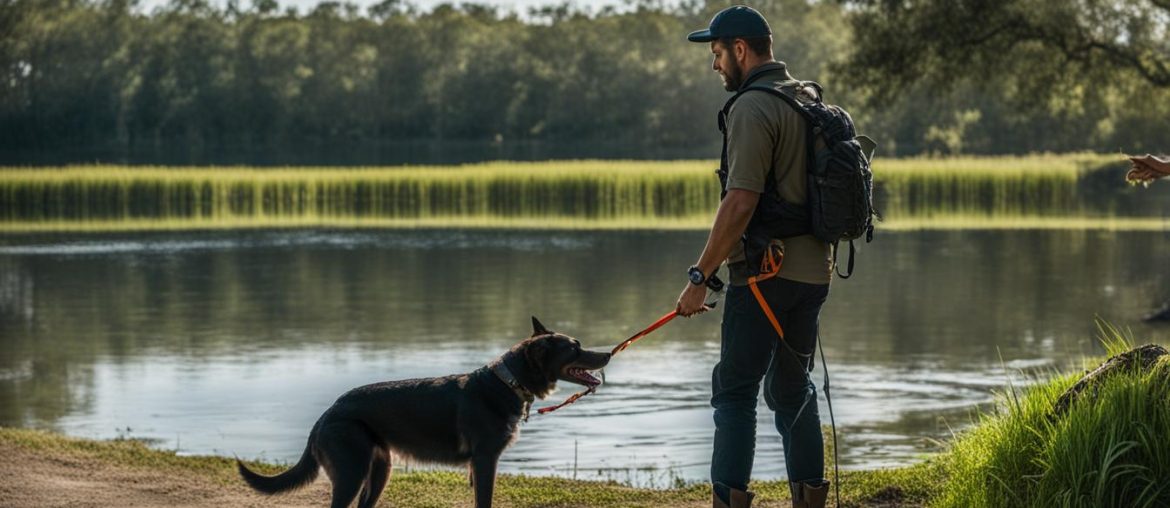As a responsible pet owner, it is good practice to understand the potential dangers that your dog may face in certain environments. One such danger, especially if you live in coastal areas of the Southeastern United States, is the presence of alligators. These formidable creatures can be found in swamps, ponds, rivers, and even along the coastline. With alligator populations on the rise and their habitats overlapping with human settlements, you should know how to keep your dog safe from alligator encounters.
Key Takeaways:
- Be aware of alligator habitats in your area and take necessary precautions.
- Avoid letting your dog swim in waters where alligators are known to inhabit, especially during their most active times.
- Keep your dog on a leash and away from the water’s edge when near alligator-prone areas.
- Report any aggressive or nuisance alligators to the appropriate wildlife authorities.
- Prioritize personal safety and avoid putting yourself or your pet in harm’s way.
General Information About Alligators and Dog Safety
To ensure the safety of your dog, it is essential to understand some general information about alligators and take necessary precautions. Male alligators in North and South Carolina can weigh over 500 pounds and grow to 12-14 feet in length, while females are smaller, weighing about half that of males. Alligators are cold-blooded creatures, and their behavior is influenced by the temperature of their environment.
Alligators are commonly found in swamps, ponds, rivers, and the coastline of the Southeastern United States, including North Carolina and South Carolina. As their populations continue to increase and their habitats are encroached upon by humans, it is advisable for dog owners to be aware of potential alligator habitats and take proactive steps to protect their pets.
You should note that alligators are naturally scared of people, but if they have been fed by humans, they may approach people. Therefore, it is good practice to avoid approaching alligators on land and refrain from running in a zigzag fashion if an alligator chases you. By being cautious and knowledgeable, you can significantly reduce the risk of alligator attacks on your dog.
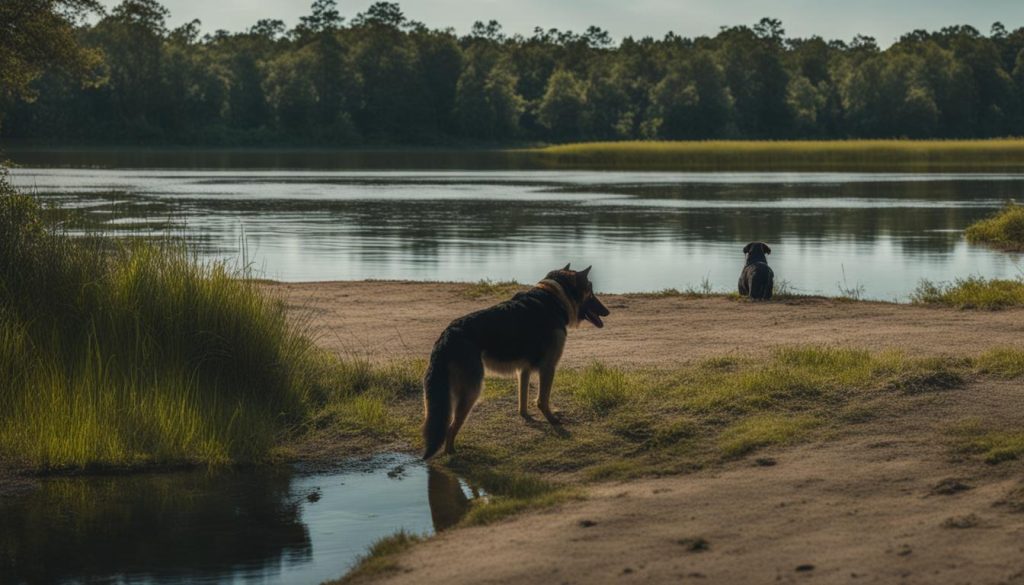
Alligator Awareness for Dog Owners
To ensure the safety of your dog in alligator-infested areas, you should be aware of your surroundings and take the following precautions:
- Avoid allowing your dog to swim in water from dusk to dawn when alligators are most active.
- Assume that all bodies of water in alligator habitats may have alligators present and keep your dog away from them.
- Keep your dog on a leash and away from the water’s edge at all times.
- During alligator courtship and nesting season (April to September), alligators are particularly aggressive. Be extra cautious and avoid disturbing their nests.
By following these safety measures, you can minimize the risk of your dog encountering an alligator and ensure their well-being in alligator-prone areas.
Tips for Protecting Your Dog From Alligators
To keep your dog safe from alligators, you should take the necessary precautions when in alligator-infested areas. Here are some essential alligator safety measures for dogs:
- Assume all bodies of water in alligator habitats may have alligators present. Avoid allowing your dog to swim or drink from these bodies of water.
- Avoid approaching alligators on land. If you encounter an alligator, maintain a safe distance and do not provoke or antagonize it.
- In the event of an alligator chasing you or your dog, do not run in a zigzag fashion. Instead, run in a straight line away from the alligator and seek shelter or higher ground.
- Be aware of the time of day when alligators are most active, which is typically from dusk to dawn. Avoid swimming or allowing your dog to swim during these hours.
In addition to these measures, you should always supervise your dog when near alligator habitats and keep them on a leash. By following these tips, you can minimize the risk of alligator encounters and ensure the safety of your furry companion.
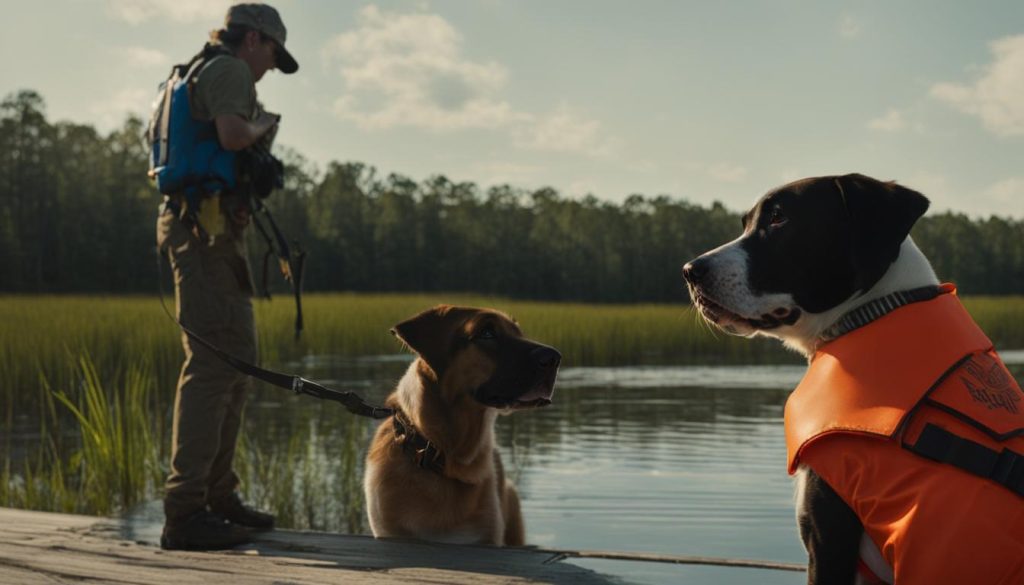
Additional Tip: Alligator Safety Products for Dogs
If you frequently visit alligator-infested areas with your dog, there are products available that can provide an extra layer of protection. Alligator repellent sprays and ultrasonic devices emit sounds that are unpleasant to alligators, helping to deter them from approaching. Additionally, there are specially designed alligator safety vests and jackets for dogs that provide additional protection in case of an alligator encounter. Consult with your veterinarian or a pet safety expert to find the best option for your dog.
Table: Alligator Safety Measures for Dogs
| Measure | Description |
|---|---|
| Avoid swimming in alligator habitats | Never allow your dog to swim in bodies of water known to have alligators present. This includes lakes, ponds, and rivers. |
| Keep your dog on a leash | Always keep your dog on a leash when walking near alligator habitats to ensure that you have control over their movements and can quickly move to a safe distance if necessary. |
| Stay vigilant and aware | Be observant of your surroundings and keep an eye out for any signs of alligator activity, such as splashing in the water or lurking near the shoreline. |
| Know how to respond in an encounter | If you encounter an alligator while walking your dog, do not approach it. Instead, calmly and slowly walk away while keeping your dog close to you. |
Safety Precautions When Fishing or Boating
To ensure the safety of your dog while fishing or boating in alligator-infested areas, it is good practice to take certain precautions. Alligators are fast and powerful swimmers, capable of reaching speeds of up to 20 miles per hour and executing the notorious “alligator death roll” when attacking their prey. Here are some safety measures to keep in mind:
- Stay alert and vigilant: Always be aware of your surroundings and keep an eye out for any signs of alligators, such as ripples in the water, floating logs, or the presence of other wildlife that may attract them.
- Keep your dog close and secure: When fishing or boating with your dog, make sure to keep them on a leash or safely secured within the boat. Alligators are more likely to target smaller animals, including dogs, so keeping them close reduces the risk of an encounter.
- Avoid fishing in alligator hotspots: If possible, choose fishing spots that are known to have a lower alligator population. This can reduce the chances of an alligator encounter and ensure a safer environment for both you and your dog.
- Make noise and create commotion: Alligators are generally wary of humans and will often retreat if they are aware of our presence. Clapping your hands, stomping your feet, or using a noise-making device can help scare them away if they get too close.
By adhering to these safety precautions, you can minimize the risk of alligator encounters while fishing or boating and ensure the safety of your beloved canine companion.
Safety Precautions When Fishing or Boating
To ensure the safety of your dog while fishing or boating in alligator-infested areas, it is good practice to take certain precautions. Alligators are fast and powerful swimmers, capable of reaching speeds of up to 20 miles per hour and executing the notorious “alligator death roll” when attacking their prey. Here are some safety measures to keep in mind:
- Stay alert and vigilant: Always be aware of your surroundings and keep an eye out for any signs of alligators, such as ripples in the water, floating logs, or the presence of other wildlife that may attract them.
- Keep your dog close and secure: When fishing or boating with your dog, make sure to keep them on a leash or safely secured within the boat. Alligators are more likely to target smaller animals, including dogs, so keeping them close reduces the risk of an encounter.
- Avoid fishing in alligator hotspots: If possible, choose fishing spots that are known to have a lower alligator population. This can reduce the chances of an alligator encounter and ensure a safer environment for both you and your dog.
- Make noise and create commotion: Alligators are generally wary of humans and will often retreat if they are aware of our presence. Clapping your hands, stomping your feet, or using a noise-making device can help scare them away if they get too close.
By adhering to these safety precautions, you can minimize the risk of alligator encounters while fishing or boating and ensure the safety of your beloved canine companion.
Safety Precautions When Fishing or Boating
To ensure the safety of your dog while fishing or boating in alligator-infested areas, it is good practice to take certain precautions. Alligators are fast and powerful swimmers, capable of reaching speeds of up to 20 miles per hour and executing the notorious “alligator death roll” when attacking their prey. Here are some safety measures to keep in mind:
| Precautions | Explanation |
|---|---|
| Stay alert and vigilant | Always be aware of your surroundings and keep an eye out for any signs of alligators, such as ripples in the water, floating logs, or the presence of other wildlife that may attract them. |
| Keep your dog close and secure | When fishing or boating with your dog, make sure to keep them on a leash or safely secured within the boat. Alligators are more likely to target smaller animals, including dogs, so keeping them close reduces the risk of an encounter. |
| Avoid fishing in alligator hotspots | If possible, choose fishing spots that are known to have a lower alligator population. This can reduce the chances of an alligator encounter and ensure a safer environment for both you and your dog. |
| Make noise and create commotion | Alligators are generally wary of humans and will often retreat if they are aware of our presence. Clapping your hands, stomping your feet, or using a noise-making device can help scare them away if they get too close. |
By adhering to these safety precautions, you can minimize the risk of alligator encounters while fishing or boating and ensure the safety of your beloved canine companion.
Keeping Dogs Away from Alligator Habitats
To ensure the safety of your beloved canine companion, it is good practice to keep them away from alligator habitats. By taking some simple precautions, you can minimize the risk of encountering these reptiles and protect your dog from potential harm.
Keeping Dogs Safe Near Alligator Habitats
1. Stay Away from Alligator-Infested Waters:
- Never allow your dog to drink from or play near bodies of water where alligators are known to frequent. Even small bodies of water, such as ponds or swamps, can be potential habitats for alligators. It is best to keep your dog on a leash and away from the water’s edge at all times.
2. Be Aware of Alligator Season:
- Alligators are most active during their courtship and nesting season, which typically occurs from April to September. During this time, they can be more aggressive and protective of their nests. You should avoid disturbing alligator nests and keep your dog away from areas where alligators may be present.
3. Leash Your Dog:
- Keeping your dog on a leash is essential when venturing near alligator habitats. This allows you to have better control over your dog and prevents them from wandering too close to potentially dangerous areas.
| Precautions | Benefits |
|---|---|
| Keeping dogs away from alligator habitats | Reduces the risk of alligator encounters and potential harm to your dog. |
| Being aware of alligator season | Minimizes the chances of disturbing alligator nests and encountering aggressive alligators. |
| Leashing your dog | Provides better control over your dog and prevents them from approaching potentially dangerous areas. |
By following these guidelines, you can help ensure the safety of your dog in areas where alligators may be present. To put it simply, it is always better to be cautious and proactive in protecting your furry friend from potential dangers. Stay informed, stay vigilant, and keep your dog safe from alligators.
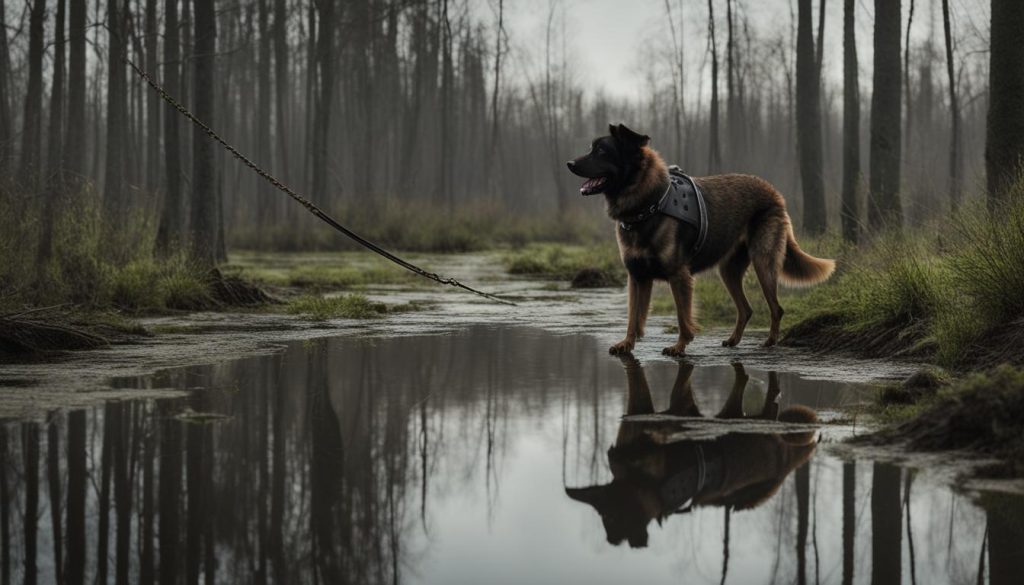
Protecting Your Property from Alligators
Alligators can pose a threat to both humans and pets, and I would advise that you take steps to protect your property from these potentially dangerous reptiles. By implementing certain safety measures, you can create a safer environment for both yourself and your furry companion. Here are some tips to consider:
Installing a Secure Fence
One of the most effective ways to keep alligators off your property is by enclosing it with a fence that is at least four and a half feet in height. While alligators are capable of climbing, they are more likely to avoid fences that are tall enough to deter them. To enhance the effectiveness of the fence, consider installing electrical wiring a few inches from the ground around the perimeter. This extra barrier can further discourage alligators from attempting to enter your property.
Removing Potential Food Sources
Alligators are attracted to potential food sources, so keep anything that might entice them away from your property. This includes items like outdoor grills, pet food, and garbage cans. By eliminating these enticing factors, you reduce the likelihood of alligators being drawn to your property in search of a meal.
Being Mindful of Water Features
If your property includes water features, such as ponds or lakes, please take precautions to minimize alligator activity. Consider installing a barrier, such as a mesh cover, to prevent alligators from entering the water. Additionally, regularly inspect those water features for any signs of alligator presence, such as tracks or nesting sites. If you suspect the presence of alligators, contact the relevant wildlife authorities for guidance on how to handle the situation.
| Protecting Your Property from Alligators | Summary |
|---|---|
| Install a secure fence at least four and a half feet in height. | A tall fence can deter alligators from entering your property. |
| Remove potential food sources from your property. | Eliminating enticing factors reduces the likelihood of alligator visits. |
| Be mindful of water features and install barriers if necessary. | Regular inspections can help identify alligator presence. |
By taking these precautions, you can significantly reduce the risk of alligator encounters on your property and ensure the safety of your beloved pets. Try to always stay vigilant and report any suspected alligator activity to the appropriate wildlife authorities for further assistance.
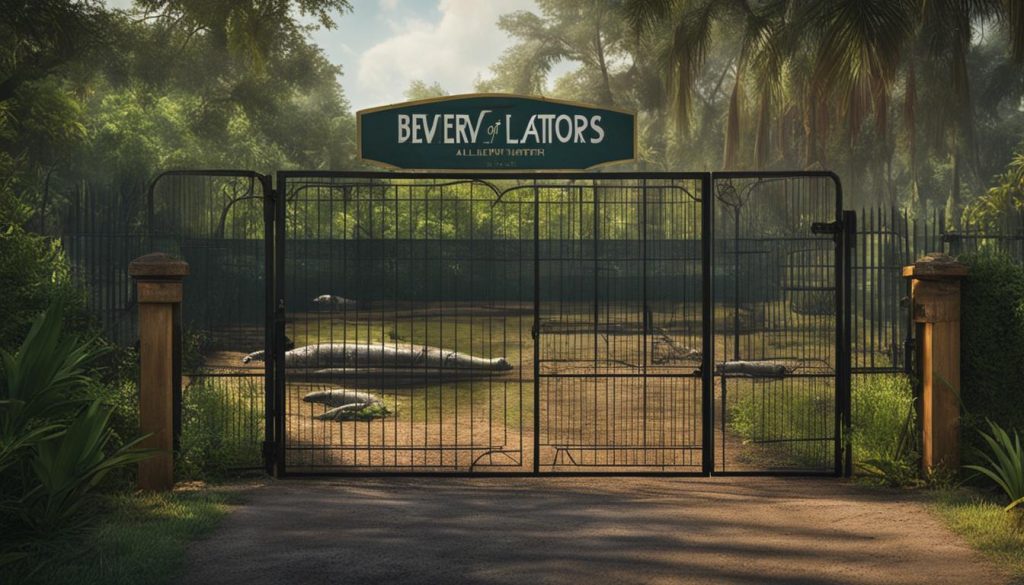
Alligator Awareness for Dog Owners: Reporting Alligators and Wildlife Removal
As a responsible dog owner, it is good practice to be aware of the presence of alligators in your area and take appropriate measures to keep your furry companion safe. In the event that you spot an alligator and believe it poses a threat, it is essential to report it to the relevant wildlife authorities. By doing so, you are not only protecting your dog but also contributing to the overall safety of your community.
Reporting Alligator Sightings
If you reside in North Carolina, you should contact the North Carolina Wildlife Resources Commission to report an alligator sighting. For those in South Carolina, get in touch with the nearest Department of Natural Resources office. These agencies have the expertise and resources to assess the situation and take the necessary action to ensure public safety.
When reporting an alligator, provide as much information as possible, such as the location, size, and behavior of the alligator. This will assist the authorities in determining the level of risk and responding accordingly. To put it simply, it is always better to err on the side of caution and report any suspected threats promptly.
Reporting alligator sightings is an important part of alligator management and conservation efforts. By notifying the appropriate wildlife authorities, you are helping to maintain a balance between human and alligator interactions.
Professional Wildlife Removal Services
In situations where an alligator is deemed a nuisance or poses a significant danger, licensed wildlife removal services may be required. These professionals have the expertise and equipment to safely capture and relocate alligators to more suitable habitats. You should rely on their expertise rather than attempting to handle the situation yourself, as dealing with alligators can be dangerous and potentially illegal.
When contacting wildlife removal services, provide them with detailed information about the alligator and the circumstances surrounding the sighting. This will enable them to assess the situation accurately and take appropriate measures to mitigate any potential risks.
Alligator Awareness and Dog Safety
Being aware of alligator habitats and taking proactive measures to protect your dog is vital for their safety. By promptly reporting alligator sightings and relying on professional wildlife removal services when necessary, you can play an active role in preventing potential conflicts between alligators and dogs. To put it simply, it is always better to prioritize safety and take the necessary precautions to keep your beloved pet out of harm’s way.
Alligator Safety Tips in Florida
When it comes to alligator safety in Florida, there are a few essential tips to keep in mind to ensure the well-being of your dog. Florida is known for its abundant alligator population, making it crucial to take precautionary measures when spending time near waterways.
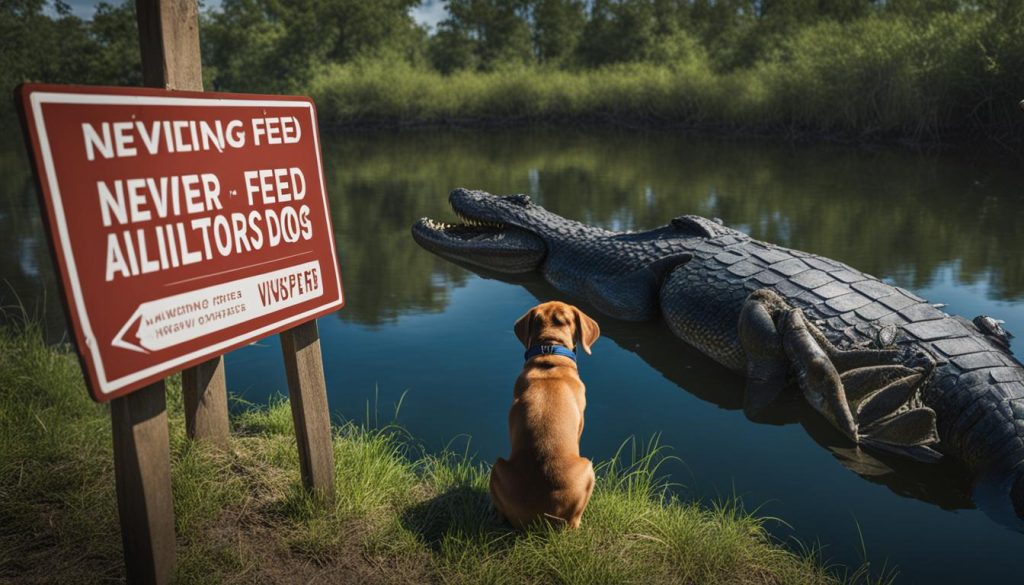
Keeping Pets on a Leash
One of the most important safety measures is to keep your pets on a leash and away from the water’s edge. Alligators may mistake pets for natural prey, and dogs, in particular, can resemble their favorite meals. By keeping your dog close and under control, you can significantly reduce the risk of alligator encounters.
Avoiding Swimming in Certain Waters
When it comes to swimming, stick to designated areas during daylight hours. Avoid allowing your pet to swim in fresh or brackish water, as these are common habitats for alligators. By choosing safe and controlled swimming areas, you can minimize the chances of potential alligator encounters.
Report Potentially Dangerous Alligators
If you come across an alligator that you believe may pose a threat, please report it to the Florida Fish and Wildlife Conservation Commission. They have the expertise and resources to handle these situations safely. To put it simply, it’s always better to err on the side of caution and let the professionals handle any potentially dangerous encounters.
By following these alligator safety measures, you can help protect your beloved pets from potential harm. Try to stay vigilant and aware of your surroundings, especially when near bodies of water in Florida.
Alligator Conservation and Statewide Programs
Protecting alligators and preserving their natural habitats is crucial for the balance of Florida’s wetland ecosystems. To ensure the coexistence of alligators and humans, the Florida Fish and Wildlife Conservation Commission (FWC) spearheads various statewide programs and initiatives.
One such program is the Statewide Nuisance Alligator Program, which focuses on addressing alligator threats in developed areas while prioritizing the conservation of alligators in their natural habitats. Through this program, contracted nuisance alligator trappers are deployed to remove alligators that pose a concern to public safety or property.
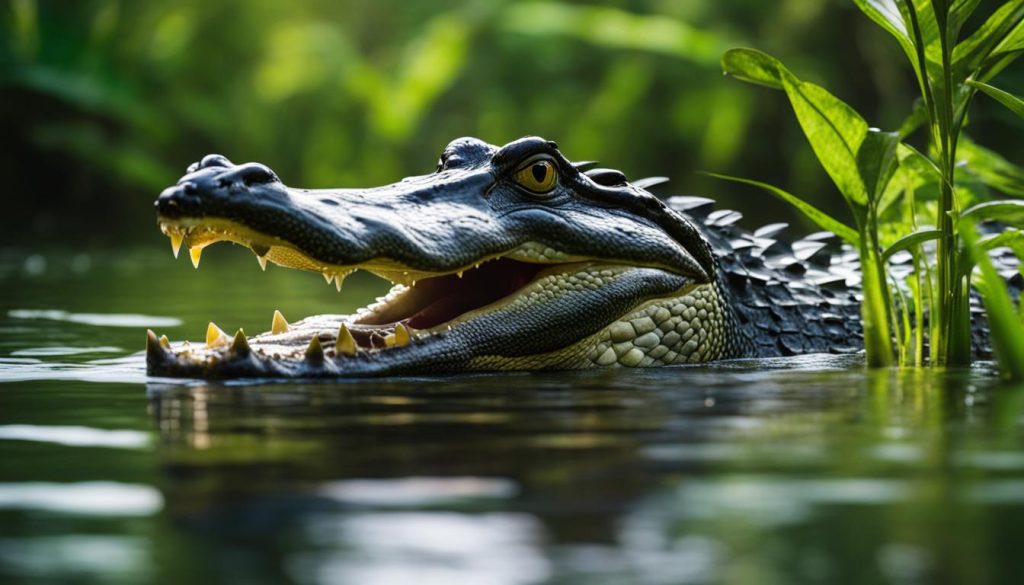
The FWC also works diligently to educate the public about alligator awareness and safety. They provide valuable resources and guidelines to help dog owners and the community at large understand the risks associated with alligators and how to protect themselves and their pets.
Through these conservation efforts and statewide programs, the FWC aims to strike a balance between alligator management, public safety, and the preservation of these magnificent creatures in their natural habitats.
Personal Safety vs. Alligator Conflict
When it comes to the question of personal safety versus saving a pet from an alligator encounter, it can be a challenging decision to make. As pet owners, we naturally want to protect our furry friends from any harm, but it is good practice to prioritize personal safety above all else. In Florida, it is actually a felony to injure or kill an alligator, so taking precautions to prevent these encounters is essential.
Alligators are powerful and unpredictable animals, and attempting to intervene in a confrontation between your pet and an alligator can be extremely dangerous. It’s always best to avoid putting yourself or your pet in harm’s way. Instead, focus on preventive measures to reduce the risk of alligator encounters in the first place. By being aware of alligator habitats and following safety tips, you can significantly minimize the chances of a dangerous situation arising.
If you do come across a potentially dangerous alligator, you should report it immediately to the appropriate wildlife authorities. They are trained to handle these situations safely and can take the necessary steps to ensure the well-being of both humans and animals. Reporting any potential threats allows experts to assess the situation and take appropriate action, ensuring the overall safety of the community.
| Personal Safety Tips | Alligator Safety Measures for Dogs |
|---|---|
| 1. Prioritize personal safety | 1. Keep your dog on a leash and away from alligator habitats |
| 2. Report any potential threats to wildlife authorities | 2. Avoid allowing your dog to swim in alligator-infested waters |
| 3. Follow alligator safety guidelines and regulations | 3. Be cautious near bodies of water in alligator habitats |
| 4. Focus on preventive measures to reduce risk | 4. Keep potential food sources away from your property to deter alligators |
| 5. Stay vigilant and aware of alligator habitats | 5. Report any alligator sightings to wildlife authorities |
By prioritizing personal safety, following alligator safety measures for dogs, and working together with wildlife authorities, we can ensure the well-being of both ourselves and our furry companions. To put it simply, it is always better to prevent alligator encounters rather than taking unnecessary risks. Stay informed, stay safe, and keep your dog protected from alligators.
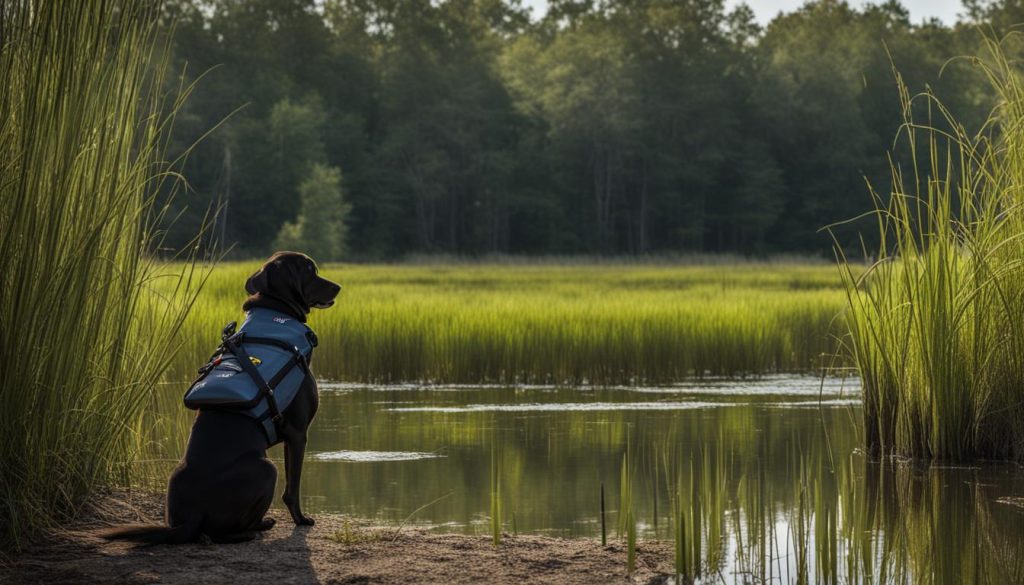
Final Thoughts
To sum it up, ensuring the safety of your dog in alligator habitats requires a combination of knowledge, precautions, and responsible pet supervision. By following the dog safety tips and alligator safety measures for dogs outlined in this guide, you can significantly reduce the risk of alligator encounters and protect your furry companion.
Try to always be aware of potential alligator habitats and assume that any body of water in these areas may have alligators present. Avoid allowing your dog to swim in water from dusk to dawn, when alligators are most active. Keep your dog on a leash and away from the water’s edge, especially during alligator courtship and nesting season.
Additionally, it is good practice to report any alligator sightings or concerns to the appropriate wildlife authorities. They have the expertise and resources to handle potential threats and ensure the safety of both humans and animals. By prioritizing personal safety, staying vigilant, and taking preventive measures, you can keep your dog safe from alligators.
FAQ
Where can alligators be found?
Alligators can be found in coastal areas of the Southeastern United States, including North Carolina, South Carolina, and Florida. They inhabit swamps, ponds, rivers, and the coastline.
How big do male alligators get?
Male alligators in North and South Carolina can weigh over 500 pounds and grow to 12-14 feet in length. Female alligators are smaller, weighing about half that of males.
How should I keep my dog safe from alligators?
To keep your dog safe from alligators, assume that all bodies of water in alligator habitats may have alligators present. Avoid approaching alligators on land and do not run in a zigzag fashion if chased. Keep your dog away from water during dusk to dawn when alligators are most active.
How fast can alligators swim?
Alligators can swim up to 20 miles per hour in water. If they catch prey, they engage in a spinning maneuver known as the “alligator death roll.”
How can I protect my dog from alligator encounters?
Keep your dog away from alligator habitats and bodies of water where alligators are known to frequent. During alligator courtship and nesting season, be particularly cautious. Keep your dog on a leash and away from the water’s edge at all times.
How can I protect my property from alligators?
It is recommended to enclose your property with a fence at least four and a half feet in height. Install electrical wiring a few inches from the ground around the perimeter to enhance the effectiveness of the fence. Keep potential food sources away from your property to deter alligators.
What should I do if I spot an alligator in my area?
If you believe an alligator poses a threat, report it to the appropriate wildlife authorities. In North Carolina, contact the North Carolina Wildlife Resources Commission, and in South Carolina, contact the nearest Department of Natural Resources office. Licensed wildlife removal services may be required if the alligator is deemed a nuisance or dangerous.
What safety measures should I take in Florida?
In Florida, keep your pets on a leash and away from the water’s edge, as they resemble alligators’ natural prey. Swim only in designated areas during daylight hours and avoid allowing your pet to swim in fresh or brackish water. If you encounter a potentially dangerous alligator, contact the Florida Fish and Wildlife Conservation Commission.
What conservation efforts are in place for alligators?
The Florida Fish and Wildlife Conservation Commission administers a Statewide Nuisance Alligator Program to address alligator threats in developed areas while conserving them in their natural habitats. The program utilizes contracted nuisance alligator trappers to remove concerning alligators. Conservation efforts and public safety are top priorities in alligator management.
Should I risk personal safety to save my pet from an alligator?
You should prioritize personal safety. In Florida, it is a felony to injure or kill an alligator. Avoid putting yourself or your pet in harm’s way and report any potential threats to the authorities.


